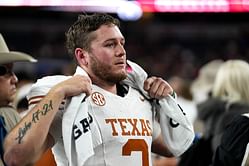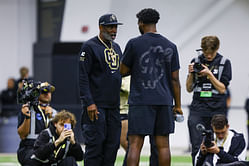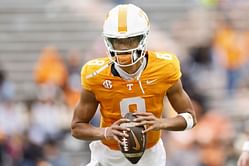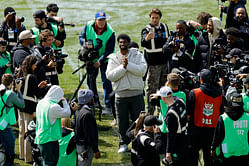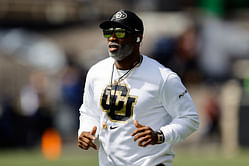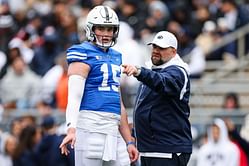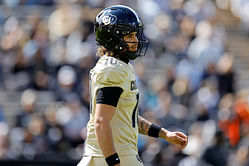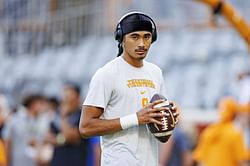
The Capital One Orange Bowl is a playoff game in college football, a semifinal in the 2024-2025 season. Established in 1935, the Orange Bowl was also amongst the oldest bowl games alongside the Sugar Bowl and the Sun Bowl. Located in Miami Gardens, Florida, United States, this bowl has been a member of the College Football Playoff since 2014. They have also represented the Bowl Coalition from 1992 to 1994, the Bowl Alliance from 1995 to 1997, and the Bowl Championship Series from 1998 to 2013.
Since the formation of the Orange Bowl in 1935, 90 editions of the game have already been played, as of January 2025. The first game saw the Bucknell Bisons beating the Miami Hurricanes 26-0. The 91st edition of the Capital One Orange Bowl game will feature the Notre Dame Fighting Irish against the Penn State Nittany Lions on January 9, 2025. Hard Rock Stadium in Miami Gardens, Florida, United States will host the Orange Bowl in 2025.
Orange Bowl Winner List
The Orange Bowl game has witnessed 90 editions of the game. While Bucknell was the first winner of the Orange Bowl game in 1935, the most recent winner of the game was Georgia in 2023. The following table details all the Orange Bowl games from the beginning till 2023 along the winers, the opponents and the scores-
| Year | Winning Team | Score | Opponent | Score |
| 1935 | Bucknell | 26 | Miami (Florida) | 0 |
| 1936 | Catholic | 20 | Mississippi | 19 |
| 1937 | #14 Duquesne | 13 | Mississippi State | 12 |
| 1938 | Auburn | 6 | Michigan State | 0 |
| 1939 | #2 Tennessee | 17 | #4 Oklahoma | 0 |
| 1940 | #16 Georgia Tech | 21 | #6 Missouri | 7 |
| 1941 | #9 Mississippi State | 14 | #13 Georgetown | 7 |
| 1942 | #14 Georgia | 40 | TCU | 26 |
| 1943 | #10 Alabama | 37 | #8 Boston College | 21 |
| 1944 | LSU | 19 | Texas A&M | 14 |
| 1945 | Tulsa | 26 | #13 Georgia Tech | 12 |
| 1946 | Miami (Florida) | 13 | #16 Holy Cross | 6 |
| 1947 | #10 Rice | 8 | #7 Tennessee | 0 |
| 1948 | #10 Georgia Tech | 20 | #12 Kansas | 14 |
| 1949 | Texas | 41 | #8 Georgia | 28 |
| 1950 | #15 Santa Clara | 21 | #11 Kentucky | 13 |
| 1951 | #10 Clemson | 15 | #15 Miami (Florida) | 14 |
| 1952 | #6 Georgia Tech | 17 | #9 Baylor | 14 |
| 1953 | #9 Alabama | 61 | #14 Syracuse | 6 |
| 1954 | #4 Oklahoma | 7 | #1 Maryland | 0 |
| 1955 | #14 Duke | 34 | Nebraska | 7 |
| 1956 | #1 Oklahoma | 20 | #3 Maryland | 6 |
| 1957 | #20 Colorado | 27 | #19 Clemson | 21 |
| 1958 | #4 Oklahoma | 48 | #16 Duke | 21 |
| 1959 | #5 Oklahoma | 21 | #9 Syracuse | 6 |
| 1960 | #5 Georgia | 14 | #18 Missouri | 0 |
| 1961 | #5 Missouri | 21 | #4 Navy | 14 |
| 1962 | #4 LSU | 25 | #7 Colorado | 7 |
| 1963 | #5 Alabama | 17 | #8 Oklahoma | 0 |
| 1964 | #6 Nebraska | 13 | #5 Auburn | 7 |
| 1965 | #5 Texas | 21 | #1 Alabama | 17 |
| 1966 | #4 Alabama | 39 | #3 Nebraska | 28 |
| 1967 | Florida | 27 | #8 Georgia Tech | 12 |
| 1968 | #3 Oklahoma | 26 | #2 Tennessee | 24 |
| 1969 | #3 Penn State | 15 | #6 Kansas | 14 |
| 1970 | #2 Penn State | 10 | #6 Missouri | 3 |
| 1971 | #3 Nebraska | 17 | #5 LSU | 12 |
| 1972 | #1 Nebraska | 38 | #2 Alabama | 6 |
| 1973 | #9 Nebraska | 40 | #12 Notre Dame | 6 |
| 1974 | #6 Penn State | 16 | #13 LSU | 9 |
| 1975 | #9 Notre Dame | 13 | #2 Alabama | 11 |
| 1976 | #3 Oklahoma | 14 | #5 Michigan | 6 |
| 1977 | #11 Ohio State | 27 | #12 Colorado | 10 |
| 1978 | #6 Arkansas | 31 | #2 Oklahoma | 6 |
| 1979 | #4 Oklahoma | 31 | #6 Nebraska | 24 |
| 1980 | #5 Oklahoma | 24 | #4 Florida State | 7 |
| 1981 | #4 Oklahoma | 18 | #2 Florida State | 17 |
| 1982 | #1 Clemson | 22 | #4 Nebraska | 15 |
| 1983 | #3 Nebraska | 21 | #13 LSU | 20 |
| 1984 | #5 Miami (Florida) | 31 | #1 Nebraska | 30 |
| 1985 | #4 Washington | 28 | #2 Oklahoma | 17 |
| 1986 | #3 Oklahoma | 25 | #1 Penn State | 10 |
| 1987 | #3 Oklahoma | 42 | #9 Arkansas | 8 |
| 1988 | #2 Miami (Florida) | 20 | #1 Oklahoma | 14 |
| 1989 | #2 Miami (Florida) | 23 | #6 Nebraska | 3 |
| 1990 | #4 Notre Dame | 21 | #1 Colorado | 6 |
| 1991 | #1 Colorado | 10 | #5 Notre Dame | 9 |
| 1992 | #1 Miami (Florida) | 22 | #11 Nebraska | 0 |
| 1993 | #3 Florida State | 27 | #11 Nebraska | 14 |
| 1994 | #1 Florida State | 18 | #2 Nebraska | 16 |
| 1995 | #1 Nebraska | 24 | #3 Miami (Florida) | 17 |
| 1996 | #6 Florida State | 31 | #8 Notre Dame | 26 |
| 1996 | #6 Nebraska | 41 | #10 Virginia Tech | 21 |
| 1998 | #2 Nebraska | 42 | #3 Tennessee | 17 |
| 1999 | #7 Florida | 31 | #18 Syracuse | 10 |
| 2000 | #8 Michigan | 35 | #5 Alabama | 34 |
| 2001 | #1 Oklahoma | 13 | #3 Florida State | 2 |
| 2002 | #5 Florida | 56 | #6 Maryland | 23 |
| 2003 | #5 USC | 38 | #3 Iowa | 17 |
| 2004 | #10 Miami (Florida) | 16 | #9 Florida State | 14 |
| 2005 | #1 USC | 55 | #2 Oklahoma | 19 |
| 2006 | #3 Penn State | 26 | #22 Florida State | 23 |
| 2007 | #5 Louisville | 24 | #15 Wake Forest | 13 |
| 2008 | #8 Kansas | 24 | #5 Virginia Tech | 21 |
| 2009 | #21 Virginia Tech | 20 | #12 Cincinnati | 7 |
| 2010 | #10 Iowa | 24 | #9 Georgia Tech | 14 |
| 2011 | #5 Stanford | 40 | #12 Virginia Tech | 12 |
| 2012 | #17 West Virginia | 70 | #22 Clemson | 33 |
| 2013 | #13 Florida State | 31 | #16 Northern Illinois | 10 |
| 2014 | #12 Clemson | 49 | #7 Ohio State | 34 |
| 2015 | #1 Clemson | 37 | #4 Oklahoma | 17 |
| 2016 | #10 Florida State | 33 | #6 Michigan | 32 |
| 2017 | #6 Wisconsin | 34 | #11 Miami (Florida) | 24 |
| 2018 | #1 Alabama | 45 | #4 Oklahoma | 34 |
| 2019 | #6 Florida | 36 | #23 Virginia | 28 |
| 2021 | #5 Texas A&M | 41 | #14 North Carolina | 27 |
| 2021 | #3 Georgia | 34 | #2 Michigan | 11 |
| 2022 | #6 Tennessee | 31 | #10 Clemson | 14 |
| 2023 | #6 Georgia | 63 | #4 Florida State | 3 |
Read More:- Orange Bowl Stadium
Orange Bowl Sponsorship and Broadcasting Rights
The Orange Bowl game has been sponsored by Capital One since December 2014, as of January 2025. However, it was also sponsored by other companies in the past. These are Federal Express/FedEx from 1989 to 2010 and then By Discover Financial from 2011 to January 2014.
The 2025 Orange Bowl games' broadcasting rights are with ESPN as per NCAA. They will broadcast the game on TV on January 9, 2025 at 7:30 pm ET. However, the game can also be streamed via WatchESPN stream.
FAQs on Orange Bowl
A. The 2025 Orange Bowl is set to be played, at Hard Rock Stadium in Miami Gardens, Florida, United States on January 9, 2025.
A. The Notre Dame Fighting Irish and the Penn State Nittany Lions will be competing in the 2025 Orange Bowl game.
A. The Orange Bowl game can be watched on ESPN and streamed on WatchESPN stream as of 2025.
A. The Tennessee Volunteers won the 2022 Orange Bowl game.
A. The Oklahoma Sooners and the Michigan Wolverines were the two teams in the 1976 Orange Bowl game.
